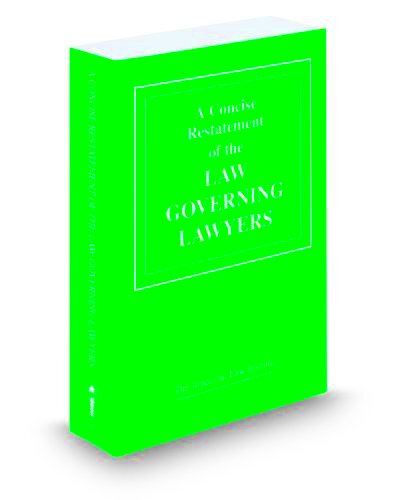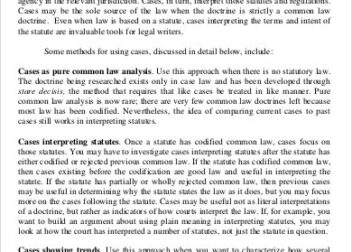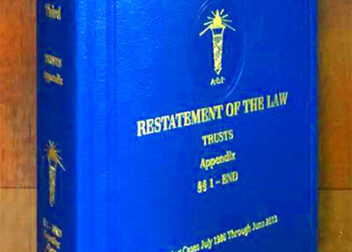Restatement of Law Governing Lawyers: Key Aspects
The Restatement of Law Governing Lawyers serves as a vital resource for understanding the ethical landscape that shapes legal practice. It compiles and clarifies the principles that lawyers must follow, ensuring that the profession maintains high standards of integrity and accountability. By outlining key responsibilities and expectations, this restatement helps both lawyers and clients navigate the complexities of legal ethics.
Purpose and Importance of the Restatement
The Restatement of Law Governing Lawyers plays a crucial role in legal practice. Here are some of its key purposes and significance:
- Guidance: It provides lawyers with clear guidelines on ethical conduct.
- Consistency: Helps ensure uniformity in legal practices across different jurisdictions.
- Education: Serves as a teaching tool for law students and new lawyers.
- Accountability: Establishes standards that can be used to evaluate lawyer behavior.
- Public Trust: Enhances the public’s confidence in the legal profession.
Overall, the restatement functions as a cornerstone of legal ethics, offering a framework that guides lawyers in their professional conduct.
Core Principles of Legal Ethics
The Restatement outlines several core principles that are essential to maintaining ethical standards in the legal profession. Here are some of the most important ones:
- Confidentiality: Lawyers must protect their clients’ information and communications.
- Competence: Lawyers are expected to provide knowledgeable and skilled representation.
- Conflict of Interest: Lawyers should avoid situations where their interests conflict with those of their clients.
- Integrity: Honesty is paramount; lawyers must not engage in deceitful practices.
- Professionalism: Lawyers should conduct themselves with respect towards clients, colleagues, and the court.
These principles not only guide lawyers in their day-to-day responsibilities but also serve to uphold the integrity of the legal system as a whole. By adhering to these ethical standards, lawyers can foster trust and respect within the legal community and beyond.
Responsibilities of Lawyers Towards Clients
Lawyers have a duty to act in the best interests of their clients, ensuring they receive the highest standard of legal representation. This responsibility encompasses various aspects of the lawyer-client relationship. Understanding these duties helps clients know what to expect and allows lawyers to navigate their professional obligations effectively.
Here are some key responsibilities lawyers have towards their clients:
- Communication: Lawyers must keep clients informed about their cases, explaining legal terms and strategies in a way that clients can understand.
- Confidentiality: Maintaining client confidentiality is paramount. Lawyers cannot disclose any information without the client’s consent, except in specific circumstances required by law.
- Competence: Lawyers must provide competent representation by staying updated on relevant laws and procedures.
- Informed Consent: Lawyers should obtain informed consent from clients before taking significant actions or making decisions that affect their case.
- Advocacy: It is the lawyer’s role to advocate for their client’s best interests while being honest and ethical in their actions.
By fulfilling these responsibilities, lawyers not only serve their clients effectively but also contribute to the overall trust and integrity of the legal profession.
Obligations Lawyers Have to the Court
Lawyers are not only advocates for their clients; they also have significant obligations to the court. Upholding these duties ensures the legal system functions properly and fairly. A lawyer’s conduct can impact the administration of justice, making it essential for them to adhere to these obligations.
Key obligations of lawyers to the court include:
- Honesty: Lawyers must always be truthful in their representations to the court, avoiding any form of deception.
- Respect: They should show respect towards the court, its officers, and the legal process, recognizing its authority.
- Disclosure: Lawyers must disclose relevant facts and legal authority that may affect the court’s decision, even if it is detrimental to their case.
- Compliance: Adherence to court rules and procedures is crucial; lawyers should ensure their conduct aligns with the established guidelines.
- Zealous Representation: While representing their clients, lawyers must balance their advocacy with their duty to the court.
These obligations not only uphold the integrity of the legal system but also reinforce the trust placed in lawyers by clients and the public alike.
Impact of the Restatement on Legal Practice
The Restatement of Law Governing Lawyers has a profound impact on legal practice, influencing how lawyers approach their roles and responsibilities. By establishing clear standards and guidelines, it serves as a foundation for ethical legal practice.
Some significant impacts include:
- Standardization: The restatement helps create uniform ethical standards across jurisdictions, reducing confusion and inconsistency in legal practice.
- Training and Education: Law schools and continuing education programs use the restatement as a vital resource for teaching legal ethics.
- Guidance for Decision-Making: Lawyers can refer to the restatement when faced with ethical dilemmas, providing them with a framework for making informed decisions.
- Influence on Policy: The restatement can shape legal policies and reforms, as courts and lawmakers often reference it in their deliberations.
- Public Confidence: By promoting ethical conduct, the restatement helps build public trust in the legal profession.
In summary, the Restatement of Law Governing Lawyers is a crucial element that not only guides individual lawyers but also shapes the future of legal practice and ethics. Its influence extends beyond the courtroom, impacting how society views the legal profession.
Critiques and Challenges of the Restatement
While the Restatement of Law Governing Lawyers serves as a critical resource for ethical standards, it is not without its critiques and challenges. Various stakeholders in the legal profession often voice their concerns, highlighting areas that may need improvement or clarification.
Here are some common critiques and challenges:
- Ambiguity: Some argue that certain provisions of the restatement are vague, leading to different interpretations and potential inconsistencies in application.
- Relevance: Critics question whether the restatement remains relevant in a rapidly changing legal landscape, particularly with advancements in technology.
- Implementation: Ensuring that all lawyers adhere to the restatement’s guidelines can be challenging, especially in jurisdictions with varying enforcement standards.
- Accessibility: Not all lawyers have easy access to the restatement, which may hinder its influence, especially among solo practitioners and those in smaller firms.
- Resistance to Change: Some members of the legal community may resist adopting new ethical standards proposed in the restatement, preferring traditional practices.
Addressing these critiques is essential for the restatement to maintain its effectiveness and credibility in guiding legal ethics.
Future of Legal Ethics and the Restatement
The future of legal ethics and the Restatement of Law Governing Lawyers is an important topic for discussion as the legal profession continues to evolve. With ongoing changes in society, technology, and the legal landscape, several trends are likely to shape the future.
Here are some key considerations for the future:
- Technological Advances: As technology transforms legal practice, the restatement may need updates to address ethical issues related to artificial intelligence, data privacy, and cybersecurity.
- Diversity and Inclusion: Future revisions may place greater emphasis on diversity and inclusion within the legal profession, ensuring equitable treatment and representation.
- Globalization: With legal practices becoming increasingly global, there may be a push for more uniform ethical standards that transcend jurisdictional boundaries.
- Client-Centered Approaches: The focus may shift towards more client-centered practices, emphasizing the importance of understanding and addressing clients’ needs and concerns.
- Continuous Education: Ongoing training and education on ethical standards will likely become essential for all legal professionals.
By addressing these considerations, the restatement can remain relevant and continue to uphold ethical standards in an ever-changing legal environment.
Frequently Asked Questions
Understanding the Restatement of Law Governing Lawyers can raise several questions. Here are some frequently asked questions and their answers:
- What is the Restatement of Law Governing Lawyers? The Restatement is a comprehensive guide that outlines the ethical responsibilities and standards that lawyers must follow in their practice.
- Who uses the Restatement? Lawyers, law students, judges, and policymakers often reference the restatement to ensure adherence to ethical standards.
- How often is the Restatement updated? The restatement is periodically reviewed and updated to reflect changes in legal practice and societal expectations.
- Can the Restatement influence legal practice? Yes, it serves as a critical resource for shaping ethical standards and guiding lawyers in their professional conduct.
- What should lawyers do if they have questions about the Restatement? Lawyers can consult the restatement directly or seek guidance from legal ethics experts or professional organizations.
These FAQs help clarify the purpose and significance of the Restatement of Law Governing Lawyers, making it easier for legal professionals to navigate ethical challenges.
Conclusion on Key Aspects of the Restatement
The Restatement of Law Governing Lawyers is a fundamental resource that shapes the ethical landscape of the legal profession. By providing clear guidelines and principles, it serves as a valuable reference for lawyers navigating their responsibilities towards clients and the court. The restatement’s emphasis on core ethical values such as confidentiality, competence, and integrity not only helps lawyers fulfill their duties but also promotes public trust in the legal system. While critiques and challenges exist, ongoing discussions about its relevance and application ensure that it continues to evolve alongside the profession. As we look to the future, the restatement will remain a vital component in guiding legal ethics and maintaining the integrity of legal practice.


